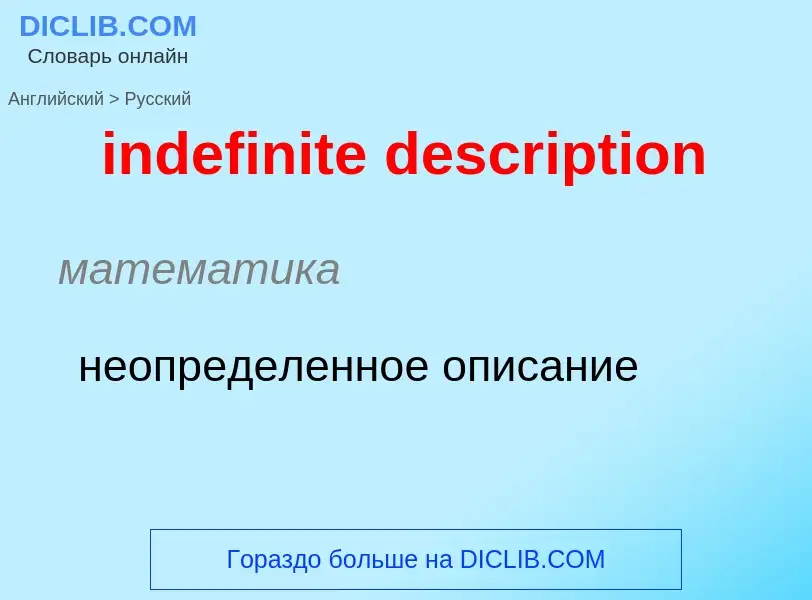ترجمة وتحليل الكلمات عن طريق الذكاء الاصطناعي ChatGPT
في هذه الصفحة يمكنك الحصول على تحليل مفصل لكلمة أو عبارة باستخدام أفضل تقنيات الذكاء الاصطناعي المتوفرة اليوم:
- كيف يتم استخدام الكلمة في اللغة
- تردد الكلمة
- ما إذا كانت الكلمة تستخدم في كثير من الأحيان في اللغة المنطوقة أو المكتوبة
- خيارات الترجمة إلى الروسية أو الإسبانية، على التوالي
- أمثلة على استخدام الكلمة (عدة عبارات مع الترجمة)
- أصل الكلمة
indefinite description - ترجمة إلى الروسية
математика
неопределенное описание
[in'def(ə)nit]
общая лексика
неопределённый
нечётко ограниченный
бесконечен
бесконечный
бессрочный
индефинитный
неограниченный
неопределенный
Смотрите также
прилагательное
общая лексика
неопределённый
неясный
не имеющий чётких границ
неопределенный (грам.)
неограниченный
редкое выражение
бесконечный
беспредельный
безграничный
синоним
تعريف
ويكيبيديا

The theory of descriptions is the philosopher Bertrand Russell's most significant contribution to the philosophy of language. It is also known as Russell's theory of descriptions (commonly abbreviated as RTD). In short, Russell argued that the syntactic form of descriptions (phrases that took the form of "The aardvark" and "An aardvark") is misleading, as it does not correlate their logical and/or semantic architecture. While descriptions may seem fairly uncontroversial phrases, Russell argued that providing a satisfactory analysis of the linguistic and logical properties of a description is vital to clarity in important philosophical debates, particularly in semantic arguments, epistemology and metaphysical elements.
Since the first development of the theory in Russell's 1905 paper "On Denoting", RTD has been hugely influential and well-received within the philosophy of language. However, it has not been without its critics. In particular, the philosophers P. F. Strawson and Keith Donnellan have given notable, well known criticisms of the theory. Most recently, RTD has been defended by various philosophers and even developed in promising ways to bring it into harmony with generative grammar in Noam Chomsky's sense, particularly by Stephen Neale. Such developments have themselves been criticised, and debate continues.
Russell viewed his theory of descriptions as a kind of analysis that is now called propositional analysis (not to be confused with propositional calculus).


